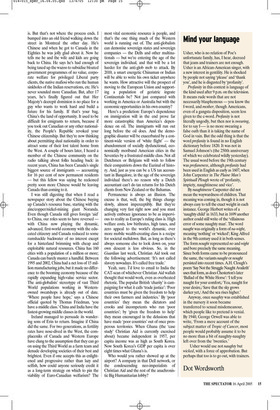Mind your language
Usher, who is no relation of Poe’s unfortunate family, has, I hear, decreed that jeans and trainers are not enough. Usher is an African-American singer, with a new interest in gentility. He is shocked by people not saying ‘please’ and ‘thank you’, and he is disgusted by ‘profanity’.
Profanity in this context is language of the kind used after 9 p.m. on the television. It means rude words that are not necessarily blasphemous — you know the f-word, and mother, though Americans, even of a gangsta disposition, seem less given to the c-word. Profanity is not literally ungodly, but then nor is swearing, for to say f—– is no more swearing a false oath than it is taking the name of God in vain. But the odd thing is that the word profanity is found in no English dictionary before 1820. It was not in Samuel Johnson’s (the 250th anniversary of which we celebrated wildly yesterday). The usual word before the 19th century was profaneness, although profanity had been used in English as early as 1607, when John Carpenter in The Plaine Man’s Spirituall Plough wrote of ‘profanity, impiety, naughtinesse and vice’.
By naughtinesse Carpenter did not mean the waywardness of children. That meaning was coming in, though it is not always easy to tell the exact weight in each instance. George Herbert writes of a ‘naughty child’ in 1633, but in 1699 another author could still write of the ‘villainous error of some naughty man’. The word naught was originally a form of na-wight, meaning ‘nothing’ or ‘wicked’; King Alfred in the 9th century used it in both senses. The form nought represented no and wight and bore precisely the same meaning. Since both forms came to be pronounced the same, the variants naught or nought persisted into recent times. A.H. Clough’s poem ‘Say Not the Struggle Naught Availeth’ uses that form, as does Chesterton’s later ‘Ballad of the White Horse’: ‘I tell you naught for your comfort,/ Yea, naught for your desire,/ Save that the sky grows darker yet,/ And the sea rises higher.’ Anyway, once naughty was established in the nursery it soon became transferred to sexual misdemeanour, which people like to pretend is venial. By 1940, George Orwell was able to write, ‘From a mere account of the subject matter of Tropic of Cancer, most people would probably assume it to be no more than a bit of naughty-naughty left over from the ’twenties.’ Usher would use not naughty but wicked, with a force of approbation. But perhaps that too is to go out, with trainers.
Dot Wordsworth
























































 Previous page
Previous page